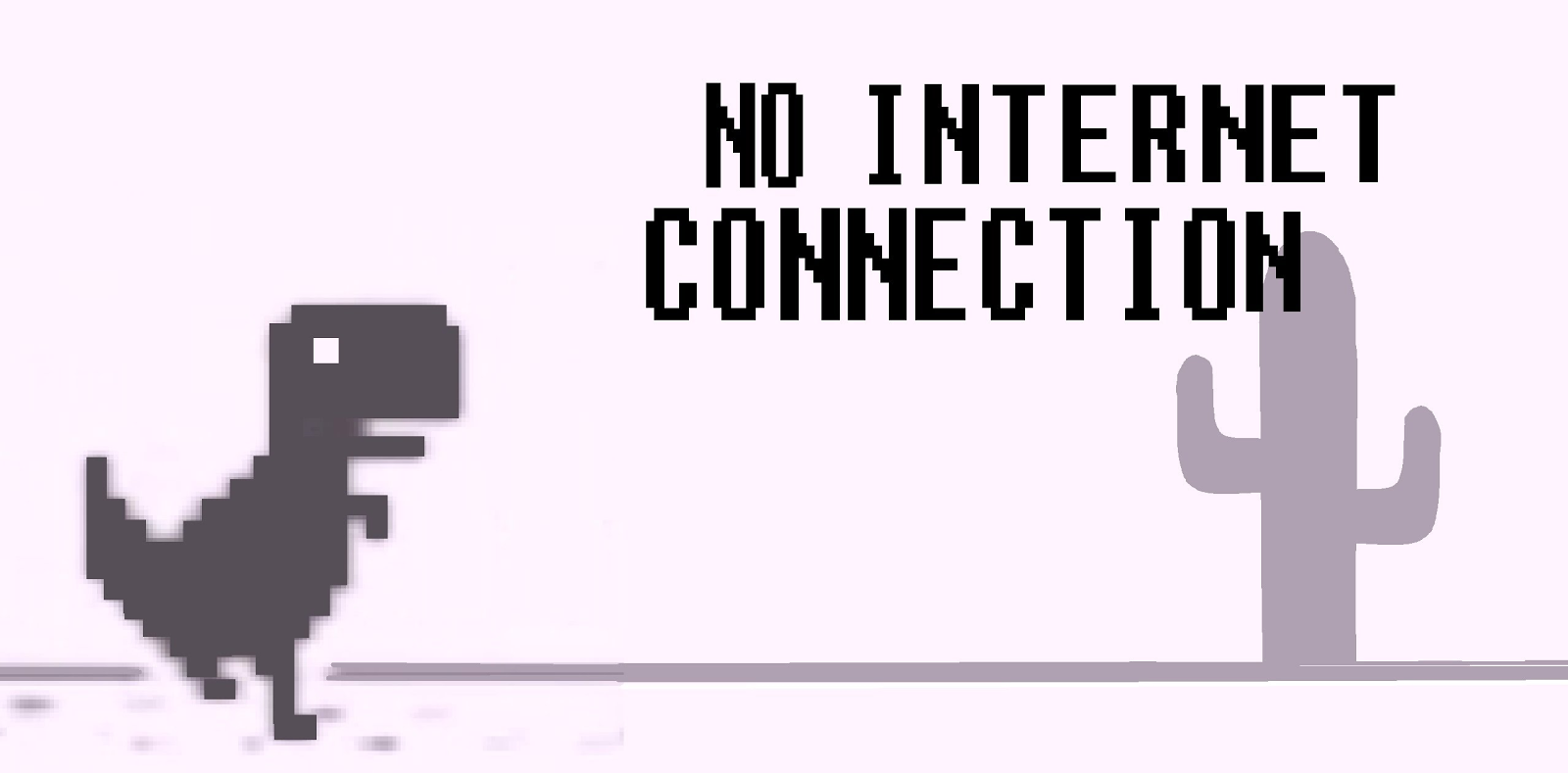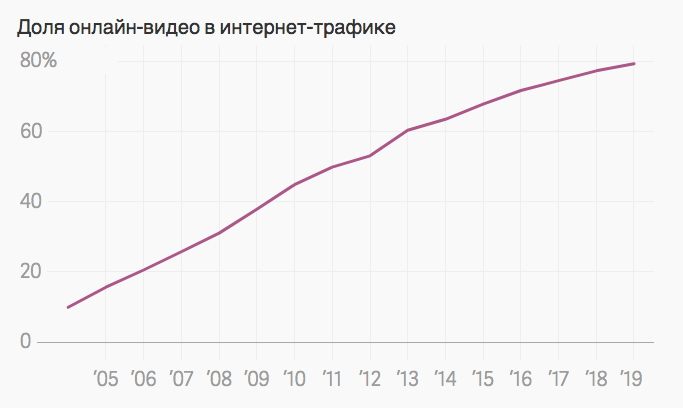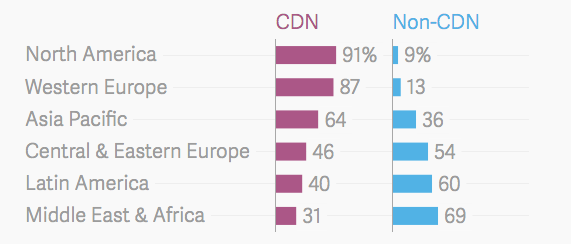The dark future of the Internet: inequality and lack of freedom

Making predictions is a thankless task. However, in order to assess the prospects that await "our and you" Internet in the near future, you do not need to look too far. We want to imagine the Internet of the future, which will certainly give everyone a common opportunity to access services and content, but this most likely will never happen.
Inequality

The Internet is a global network, right? However, most of the traffic in it passes through private networks of mega-corporations. Amazon, Microsoft, Facebook and Google are expanding their content delivery networks (CDNs) at such a pace that in 5 years 70% of all traffic will pass through them.
The main reason for this situation is the popularity of streaming video broadcasts. According to Cisco forecasts, by 2020 90% of all Internet traffic will be accounted for by video. This is a very real forecast, because in 2006 the video accounted for only 12% of the traffic. No one wanted to watch a video with buffering, and Google set about creating its own CDN system, investing billions of dollars in infrastructure. The success was not long in coming - by 2009, Google accounted for 5% of global Internet traffic, and other companies (Microsoft and Yahoo) began to learn from this experience.
According to researchers from Nielsen, in the first quarter of 2016, the duration of watching various types of online video (by people aged 18 to 34) reached 30 hours a week, confidently overtaking television (it was watched 21 hours).

From the results of a Cisco survey (which kindly provides the infrastructure for backbone traffic), it can be seen that video-streamlining and other online media CDNs are improving at an unprecedented pace. The main investors are Netflix, Google and Facebook. Deploying such networks is much cheaper than laying optical transatlantic cables. Researchers at TeleGeography indicate that almost half of all traffic through the Internet actually passes through these parallel routes.

And in different regions the situation varies greatly:

CDN dominance will be more pronounced in rich countries: North America, Western Europe, and Asia Pacific. By 2021, 91% of all Internet traffic in North America will go through the CDN, compared with 31% in the Middle East and Africa. About 60% of all Internet traffic will pass through a private CDN server created by Netflix in North America in 2021. Only ten percent of Internet traffic in the Middle East and Africa will go through fast private CDNs.
What happens in countries where the demand for paid services is low? The quality of the “internet of the future” will be insufficient. While users in countries with deployed CDNs will get smooth, high-resolution streaming video in real time, fast voice interfaces, minimal response for online games and other benefits, this will not happen in poorer regions. Hope for the charity of private corporations is not necessary - it can take years, even decades, to improve the economic and investment situation in disadvantaged regions.
This data transfer scheme means that content owners (such as Google and Netflix) are de facto more powerful than ever and can easily control the way content is delivered to the end user. Who wants (and can) compete with Google without owning their own CDN system? In the end, consumers can choose a small number of companies that own both data on the Internet and their means of delivery. In the long run, this will lead to a “good old” monopolization and will limit users in choosing the content.
And Alphabet is boldly experimenting in this direction: potentially, the Google Fiber project will be able to become the only way to access the new, super-fast Internet, the content of which will run exclusively through Google servers. By competing with the "first level" providers, private companies will be able to gain a significant advantage. This will not be too difficult, since the number of large Internet providers in countries is often not very large. For example, in England, the eight best Internet service providers provide 70% of all traffic.
With the increasing speed of the mobile Internet and the increasing popularity of wireless connectivity in rural areas, the problem will worsen. Users want to watch videos without interruption and in good quality, and without expensive infrastructure, small providers will start losing their subscribers.
At the same time, projects aimed at providing high-speed Internet, even the most remote corners of the world, are still far from real implementation. The Loon project, being developed by Google X, which implies the provision of Internet access to residents of rural areas and remote regions, will not solve the problem of the future gap as the Internet and will additionally give Google (and other companies with similar projects) access to the “last mile” connection.
Lack of freedom

Many technological services that will appear on the Internet of the future, risk initially becoming highly centralized, which will seriously affect our daily lives. Pirate Bay founder Peter Sunde pays attention to the loss of our control over the Internet of things.
Other researchers agree with him, in particular Maria Farrell, the former senior executive director of ICANN. According to her, in the traditional Internet there is a consolidation of power, which in the medium and long term can lead to the fact that local content providers will be ousted. Vertical integration leads to a set of global monopolies in social networks, in search and in content delivery.
Joe McName, executive director of the European human rights group EDRi, asks: “What happens when someone has their own CDN infrastructure and access to the last mile, like Facebook and Google? You risk finding yourself in another world. "
It is easy to do without violating the law on net neutrality. Even today, Netflix actively cooperates with some providers, ignoring others - and the access speed starts to differ significantly. In the competition "content provider vs provider" the winner is the content owner. So it was in 2014, when a conflict arose between Netflix and operator Verizon. Ultimately, the consumer wants to watch the video, and the operator’s technical difficulties are of little concern to him.
Even very successful technologies, such as Bittorent, cannot compete with the financial capabilities of tech giants investing in private CDN infrastructure. In 2008, Bittorent accounted for up to one third of all Internet traffic, and today it has fallen to 1%.
Imagining the future, researchers are wondering what the Internet will be like, where will high-quality VR video be in demand? Who can provide the speed required for holographic communication? Will the Internet remain a “free network” or turn into a set of “virtual private networks”?
From various proprietary devices to future self-driving cars, everything belongs in one way or another to several large corporations. Over the past 10 years, almost any successful technology company or website has been purchased by the big five: Amazon, Google, Microsoft, Apple and Facebook.
Who can resist these giants? Peter Sunde believes that the only chance is to choose the lesser of two evils and allow the state to impose various restrictions. Not a very happy prospect, but there are positive examples, for example, the successes of the Pirate Party in Iceland.
And if we are talking about non-freedom, then it suffices to recall how in 2012 Google, Microsoft and Netflix wanted to add DRM to HTML5. They actually succeeded in 2017 - the W3C approved the DRM standard for HTML5. DRM-plugin itself has already fully integrated into Chrome 57. This means that copyright holders will be able to prohibit and restrict the playback of movies and music on users' computers.
The Internet of the future promises to be a dark place, and some day we will be able to say that it all began with an innocent "we just wanted to watch the video without buffering."
All Articles